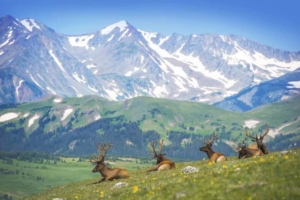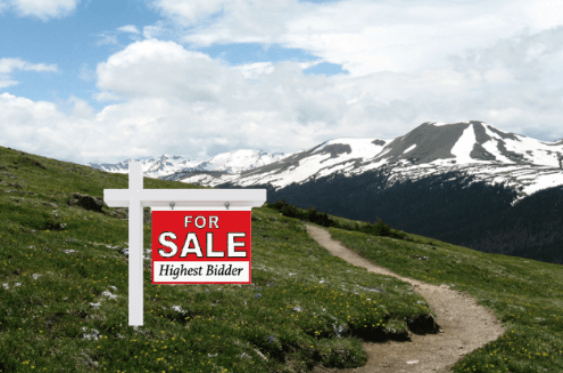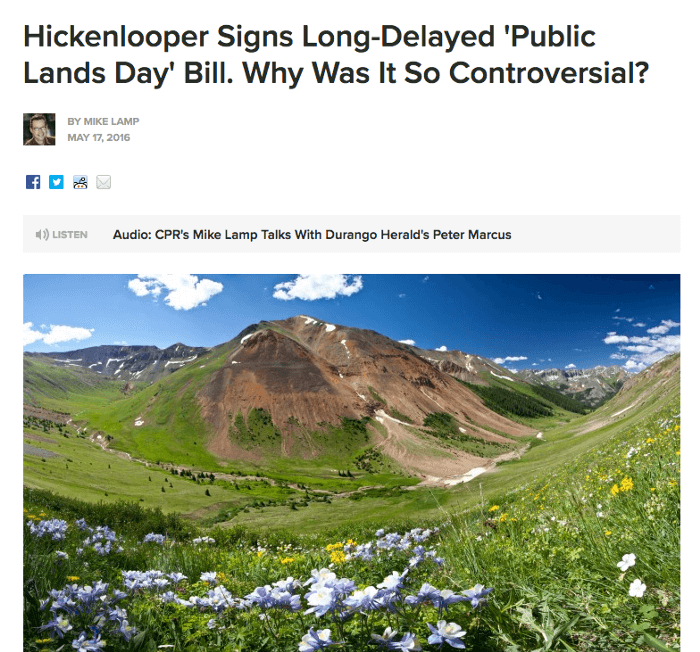Written by Gabe Kiritz, Public Lands Business Organizer
There have been several recent attacks from Washington, D.C. on Colorado’s public lands and waters. Just this week, the Trump administration issued an executive order that will begin a process to “review” the 30 national monuments created since 1996 that are larger than 100,000 acres, which could result in Colorado’s iconic Canyons of the Ancients national monument being shrunk or losing it’s protections entirely.
Additionally, the Trump administration’s proposed budget threatens harmful cuts to our nation’s public lands and environment. The Department of Interior, which manages our national parks, national wildlife refuges, other public lands, is facing a massive 12 percent cut that would have major impacts on conservation and our recreation economy.
These public lands support diverse economic interests, including an outdoor recreation economy that’s estimated to be as large as the auto industry and pharmaceutical industry combined, at $887 billion. According to the Outdoor Industry Association’s 2017 Outdoor Recreation Economy Report, outdoor recreation employs more Americans than construction, computer technology, or education. Cutting funds for our public lands damages the communities that depend on tourism and outdoor recreation, the wildlife living on those lands, and the health and well-being of Americans who explore our nation’s wild places.
That’s why Colorado businesses have decided to stand up and speak out. In fact, 98 businesses just signed on to a letter with the Colorado Outdoor Business Alliance calling for Senator Cory Gardner to defend and protect Colorado’s public lands. Here’s an excerpt from their letter, and you can read the full text here:
“Colorado’s national parks, forests, wildlife refuges, wilderness areas, and monuments are essential to our industries, way of life, and bottom lines. COBA members are united to conserve and protect access to our public lands and sustain our state’s economy….
We now urge you to support our economic interests by advancing meaningful public lands protections and defending our national public lands from any and all legislative attacks…”
The companies that signed this letter are outdoor recreation manufacturers, retailers, guides, and outfitters, alongside ranches, marketing firms, tech companies, and startups, depend on public lands for their way of life and to attract employees. They make Colorado a thriving place to do business.
With this letter in hand, seven Colorado business leaders flew to Washington, D.C. on March 27th, 2017 to meet with staff from Senator Michael Bennet, Senator Gardner, and Congressman Scott Tipton’s offices. There, they called for leadership in standing up for Colorado’s public lands. They asked Colorado’s congressional delegation to:
- Defend against all attacks on bedrock conservation laws like the Antiquities Act and Wilderness Act
- Fight back against any attempts to facilitate the transfer of public lands to the states or private interests
- Protect local communities, taxpayer resources, and outdoor recreation by supporting rules to protect air quality from oil and natural gas drilling
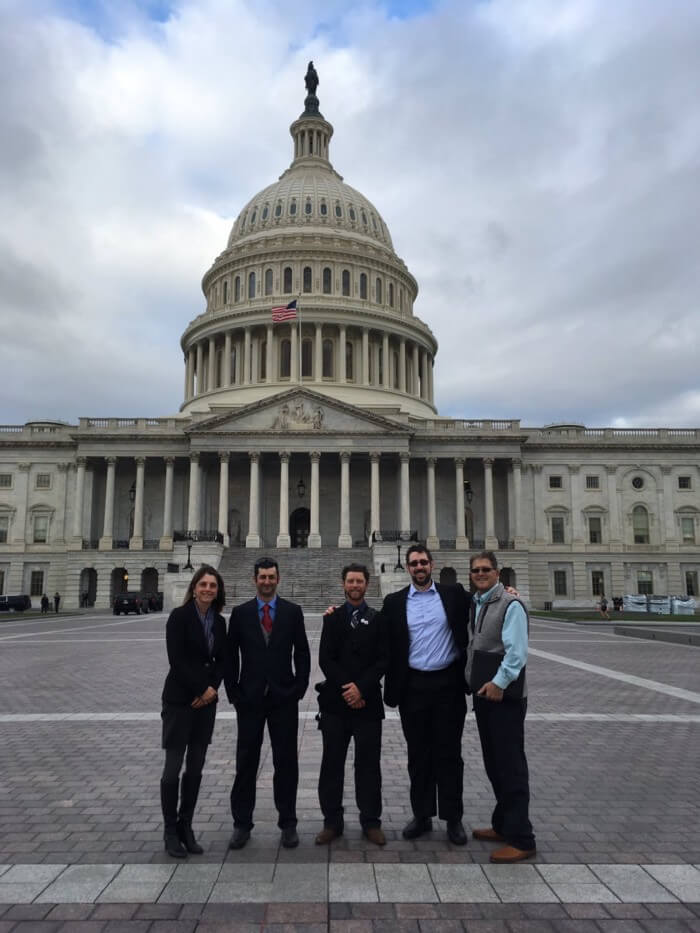
Colorado business leaders in Washington D.C.
The call for leadership has been made — will our representatives respond and protect Colorado’s economy?
The outdoor recreation industry in Colorado has continued to be an important indicator of how much progress Colorado has made on public lands over the last few years. For example, no land seizure bills have passed in the Colorado state legislature, despite almost ten attempts by extremist legislators to do so. These bills would have paved the way for our public lands to be seized by the state and eventually leased or sold off to private interests. Additionally, last year our state legislature established Colorado Public Lands Day, the first state holiday of its kind in the country.
That’s why, when the Outdoor Industry Association announced that it was looking for a new home for its massive Outdoor Retailer show that is friendlier to public lands that Utah, Colorado was in a position to make a strong case that we deserve the show. In fact, Conservation Colorado ran these ads in Utah newspapers making the case for the show to come here:
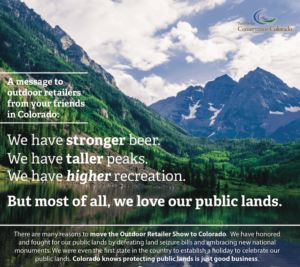
Senator Gardner claims to stand with Colorado businesses and the outdoor recreation industry. However, his track record thus far this Congress on protecting public lands and air quality, two fundamental pieces of natural infrastructure that sustain a healthy recreation economy and Colorado businesses, does not reflect these values. Senator Gardner must prove he values public lands as much as the support of the outdoor industry. Defending against attacks on our lands and supporting proactive legislation is a good place to start.
As the businesses said in their letter to Senator Gardner: “Our public lands are essential to Colorado’s economy and quality of life. Please uphold the legacy of bipartisan support for protecting public lands that makes us proud to base our businesses in Colorado.”




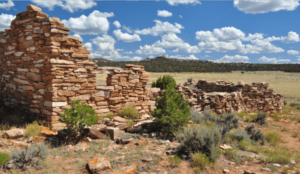
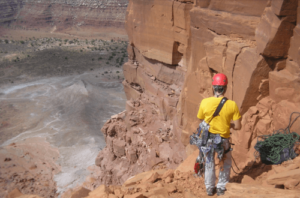
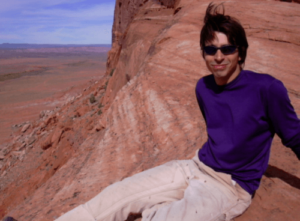
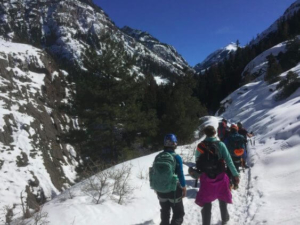 In short, climate change doesn’t just affect high alpine creatures, coastal communities, or big ski resorts. It affects almost all forms of outdoor recreation, threatening our seasons and making planning nearly impossible. Soaring temperatures and unpredictable weather events are a major headache for guides, outdoor enthusiasts, and outing programs.
In short, climate change doesn’t just affect high alpine creatures, coastal communities, or big ski resorts. It affects almost all forms of outdoor recreation, threatening our seasons and making planning nearly impossible. Soaring temperatures and unpredictable weather events are a major headache for guides, outdoor enthusiasts, and outing programs.